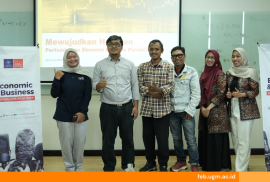On Sunday (14/7) the Department of Economics, Faculty of Economics and Business, University of Gadjah Mada (FEB UGM) held a Seminar and Public Lecture (SinarKU). Bringing the topic of “Pre-Work Card: Theory, Policy, Implementation”, this time SinarKU discussed the Pre-Work Card Program that was launched by the Government last April. Given the conditions caused by Pandemic Covid-19, the seminar was held online through the Webex platform. About 150 participants attended the seminar, both from academia and the general public. This seminar was moderated by Eny Sulistyaningrum, Ph.D. and was attended by two speakers, namely Executive Director of the Pre-Work Cards Management, Denni Puspa Purbasari, Ph.D. and Elan Satriawan, PhD. as Head of the National Policy Team for the Acceleration of Poverty Reduction (TNP2K).
The discussion was begun by a presentation of the Pre-Work Card Program by Denni Puspa Purbasari. He explained the difference between the Pre-Work Card Program and the Regular Scheme in government. Denni quoted the words from Milton Friedman. “If we want to encourage positive activities, we have to choose whether to subsidize producers or to subsidize consumers, in our literature there is such a thing as positive externalities, then it will produce subsidies,” Denni said. He revealed that the Workers Card provides subsidies for training consumers and consumers have control to choose (consumer sovereignty). With that, the Pre-Work Program produces consumers, providing training subsidies to be given to consumers by collaborating with the credible training institutions.
Denni also revealed various reasons why the Pre-Work Program currently uses an online based system or e-marketplace, including being able to bring together supply and demand, overcome assimetric information, reduce searching and transaction costs, and e-marketplaces considered to be able to provide market equilibrium faster. “The e-marketplace also provides a referred system, which is a good training institution that gets a lot of stars, and vice versa the less good get a few stars, so the reputation game can be applied,” said Denni. He believes that the best evaluators come from the participants, because the reviews and ratings provided will provide information to others, so that at the end it remains a good performer that will last longer in the market.
But he clarified that the Pre-Work Program was originally designed using an offline and online based system. Because the situation is not possible due to the pandemic that requires physical distancing and limiting mobility, offline based should be done by using a professional trainer, while changing to an online based operation using e-marketplaces or digital platforms such as Teacher’s Room, Tokopedia, BukaLapak etc.
If a question reveals regarding the reasons of the government did not make a super platform and abandoned cooperation with the private sector, he asserted that if the government made it, there would be no competition in the market, no evaluation and no improvement to compete with competitors. Another reason is because the private sector has users experience, has more reach and capability to provide training.
Related to the controversy of the Pre-Work Program compared to the unpaid training platform, he explained that the commission is addressed for the services provided by the service providers, namely by the marketplace, if it is eliminated, then it inevitably has to take costs from other places. In addition, the incentives are also useful for the platform to be encouraged to continue to improve the quality of service, “Indeed, there are many institutions that offer free training now, but if viewed from the cost side, the total cost is positive, the total profit will be negative, the training quality is not good and the sustainability of this model is not long-term and will eventually die,” explained Denni.
Next, the seminar is continued by a presentation by Elan Satriawan who talked about program issues related to the Pre-Work Program. Pre-Work program according to him is intended as one way to find a mismatch between supply and demand in the market. But according to him not all mismatch problems can be overcome with the program. “The pre-Work program cannot be given a mandate for all mismatches that occur. Especially from the supply side (workers) and from the demand side (the employer), “said Elan.
Elan added that in the current Covid-19 situation, the government must also fill the gaps for social protection programs. Especially talking about how the middle group, who are vulnerable. According to him, the Government should not only provide support to the middle 40% category, because there are other groups who are also very influenced by Covid-19, especially in health and economic matters.
At the end of his presentation, Elan gave an overview of some things that could be improved from the Pre-Work Program in the future. He hopes that the training that will be created will also provide opportunities, post jobs, and connect needs between demand and supply. This will be useful for the beneficiaries to find out what jobs are needed by the market, so that the beneficiaries can align the training with the expected outcomes, especially towards improving skills and beneficiaries and then get a job as intended from the start of the Pre-Work Program.
Translator: Laras OIA




